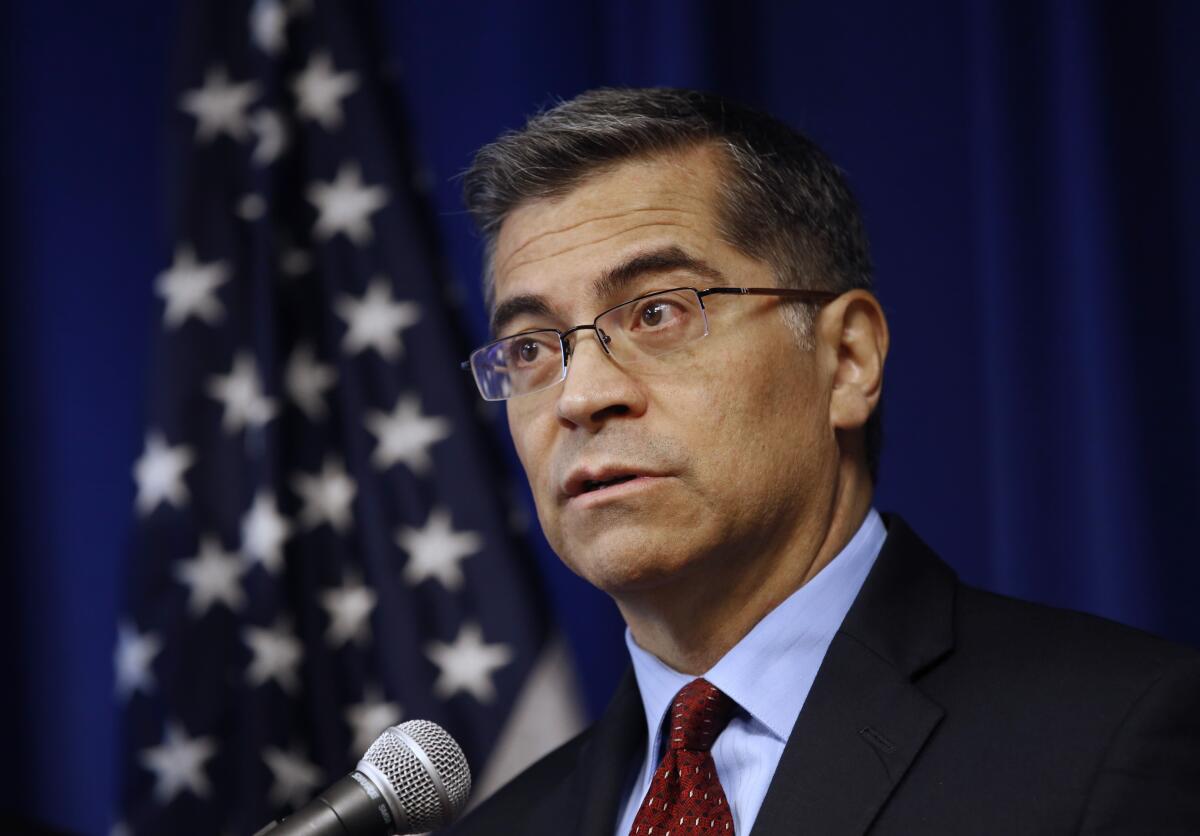Editorial: Xavier Becerra is more than just Biden’s Obamacare fix-it guy

- Share via
California Atty. Gen. Xavier Becerra has been one of the most visible defenders of the Affordable Care Act in recent years, repeatedly filing lawsuits against Republican efforts to dismantle it. That’s one reason President-elect Joe Biden tapped him to lead the Department of Health and Human Services, the agency that administers the ACA for the federal government.
But HHS, which has the largest budget of any federal agency, does a lot more than just operate the ACA’s insurance-buying marketplaces in dozens of states. Among many other things, the department runs Medicare and Medicaid, oversees federally funded medical research through the National Institutes of Health, regulates pharmaceuticals through the Food and Drug Administration, fights infectious diseases through the Centers for Disease Control and Prevention, and oversees federal mental health, substance abuse and child development programs.
And as deeply involved as Becerra has been with the ACA since his days in the House Democratic leadership, his background is in law and politics, not healthcare. Nor has Becerra shown himself to be a visionary leader or a wizard at crafting policy; he’s been more of a Democratic Party team player, someone called on to carry out a different leader’s vision or, in the case of the ACA and other Obama administration policies, to protect them from attack. For the last four years, he’s practically been the in-house counsel for the Democratic resistance, filing more than 100 lawsuits against the Trump administration on a wide variety of issues.
Still, Becerra is a good choice to lead HHS in this moment for a number of reasons, both practical and symbolic. Born in Sacramento to working-class parents who were raised in Mexico, Becerra would be the first Latino to lead HHS if he’s confirmed by the Senate. His background gives him valuable insight into underserved Americans; as Peter V. Lee, executive director of Covered California, put it: “He’s lived in Latino communities where people don’t have access to healthcare.” His selection sends a particularly important message at a time when the COVID-19 pandemic is disproportionately affecting Latino and Black Americans, who are more likely to have underlying health conditions due to social and environmental factors.
His work defending the ACA and how it’s been implemented in California position Becerra well to advance Biden’s goal of not just repairing the damage done by the Trump administration, but building on the law to make coverage available and affordable to more Americans. Say goodbye to the legal contortions HHS went through trying to knock more people off Medicaid, deny contraceptive coverage to more women, promote junk insurance plans and let healthcare providers discriminate against LGBTQ Americans. Say hello to renewed efforts to promote the ACA’s subsidized insurance coverage, persuade states to extend Medicaid to more low-income residents, narrow the racial gap in healthcare outcomes and create a public alternative to private health insurance plans.
(And yes, California, say hello to an ally at HHS, instead of an antagonist.)
Becerra has also shown an interest in holding down the underlying costs that are driving up health insurance premiums. This is a politically thorny issue because few elected officials want to battle doctors and hospitals over how much they charge for care. But as attorney general, Becerra at least sought to rein in some of the anti-competitive practices and mergers that have given drugmakers and health systems the power to drive up prices far faster than inflation. Ultimately, the only way to make healthcare more affordable is to tackle the costs in the system by addressing both the social factors affecting health and the prices charged for care.
Beyond all that, one of the main roles played by the secretary of HHS is to set the tone for the department. During the Trump administration, the consistent message was one of minimization and disengagement. Becerra’s record shows that he will stand for outreach and expansion.
The HHS secretary also has to manage a sprawling department. Becerra’s four years at the California Department of Justice, where he was seen as a capable manager, will help on that front, but at least as important will be his ability to attract talented administrators — in particular, to run the Centers for Medicare and Medicaid Services, which has been the tip of the spear for federal health policy.
Biden named a number of medical professionals and healthcare experts to join Becerra in the new administration, including Dr. Anthony S. Fauci as his chief medical advisor on COVID-19 and Dr. Marcella Nunez-Smith, the founding director of Yale School of Medicine’s research program on health equity, to lead a new COVID-19 Equity Task Force. The appointments signal that the new administration’s policies will be based more on science, research and outcomes than the current one’s efforts, but we already knew that was going to be the case. With Becerra, Biden is giving someone who’s spent four years defending the protections for healthcare consumers the opportunity to build on them.
More to Read
A cure for the common opinion
Get thought-provoking perspectives with our weekly newsletter.
You may occasionally receive promotional content from the Los Angeles Times.










